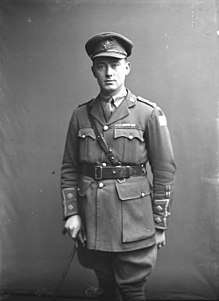Charles Smith Rutherford
Charles Smith Rutherford VC, MC, MM (9 February 1892 – 11 June 1989) was a Canadian recipient of the Victoria Cross, the highest and most prestigious award for gallantry in the face of the enemy that can be awarded to British and Commonwealth forces.
Charles Smith Rutherford | |
|---|---|
 | |
| Born | 9 February 1892 Colborne, Ontario |
| Died | 11 June 1989 (aged 97) Ottawa, Ontario, Canada |
| Buried | Union Cemetery, Colborne |
| Allegiance | |
| Service/ | Canadian Expeditionary Force |
| Rank | Captain |
| Unit | 5th Battalion, Canadian Mounted Rifles Veterans Guard of Canada |
| Battles/wars | World War I |
| Awards | |
| Other work | Sergeant-at-Arms |
Early years
Rutherford was born on a farm in Colborne, Ontario on 9 January 1892. He joined The Queen's Own Rifles of Canada in 1916 and was posted to the 5th Battalion, Canadian Mounted Rifles, CEF.[1]
World War I
He began his service in the ranks, and as a sergeant was awarded the Military Medal on 23 February 1918.[2] After being commissioned, he was also awarded the Military Cross, the full citation was not published until after that of his VC, in a supplement to the London Gazette of 10 January 1919 (dated 11 January 1919):
As our right flank was "in the air" for over 4,000 yards, this officer was detailed with his platoon and a Tank to clear up a village. This he did most successfully, killing a large number of the enemy and taking several prisoners. The coolness and determination which he displayed in clearing up the village and his marked control over his men at all times cannot be too highly commended.[3]
Rutherford was 26 years old serving in the 4th Battle of the Scarpe near Monchy, France when he was awarded the Victoria Cross. On 26 August 1918, while commanding an assaulting party, he found himself a considerable distance ahead of his men and at the same moment saw a fully armed strong enemy party outside a pill-box in front of him. By masterly bluff he managed to persuade the enemy that they were surrounded and the whole party of 45, including two officers and three machine-guns, surrendered. The lieutenant then observed that gun fire from another pill-box was holding up the assault, so with a Lewis gun section he attacked it capturing another 35 prisoners and their guns. The full citation was published in a supplement to the London Gazette of 12 November 1918 (dated 15 November 1918):
For most conspicuous bravery, initiative and devotion to duty. When in command of an assaulting party Lt. Rutherford found himself a considerable distance ahead of his men, and at the same moment observed a fully armed strong enemy party outside a "Pill Box" ahead of him. He beckoned to them with his revolver to come to him, in return they waved to him to come to them. This he boldly did, and informed them that they were prisoners. This fact an enemy officer disputed and invited Lt. Rutherford to enter the "Pill Box", an invitation he discreetly declined. By masterly bluff, however, he persuaded the enemy that they were surrounded, and the whole party of 45, including two officers and three machine guns, surrendered to him.
Subsequently he induced the enemy officer to stop the fire of an enemy machine-gun close by, and Lt. Rutherford took advantage of the opportunity to hasten the advance of his men to his support.
Lt. Rutherford then observed that the right assaulting party was held up by heavy machine-gun fire from another "Pill Box". Indicating an objective to the remainder of his party he attacked the "Pill Box" with a Lewis gun section and captured a further 35 prisoners with machine guns, thus enabling the party to continue their advance.
The bold and gallant action of this officer contributed very materially to the capture of the main objective and was a wonderful inspiration to all ranks in pressing home the attack on a very strong position.[4]
He later achieved the rank of captain.
Post World War I
From 1934 to 1940, Rutherford was the Sergeant at Arms of the Ontario Legislature when Mitchell Hepburn was Premier. He was the first sergeant to eject a member of the Legislature.
During World War II he served with the Veterans Guard of Canada, reaching the rank of Captain.
C.S. Rutherford was the last recipient of the Victoria Cross from World War I to die, on 11 June 1989 at the age of 97.[5][6] He is buried at The Union Cemetery, Colborne, Ontario, Canada.
The location of Rutherford's medals is not public knowledge.[7]
References
- http://www.legionmagazine.com/en/index.php/2005/09/on-the-offensive-in-1918/
- "No. 30540". The London Gazette (Supplement). 22 February 1918. pp. 2413–2438.
- "No. 31119". The London Gazette (Supplement). 10 January 1919. pp. 2413–664.
- "No. 31012". The London Gazette (Supplement). 12 November 1918. pp. 13471–13472.
- » » Article: Charles Rutherford vc, mc, mm - Out of the Shadows
- Charles Smith Rutherford, VC,MC,MM, Colborne, ON, 1987 Archived 15 March 2008 at the Wayback Machine
- http://www.vconline.org.uk/charles-s-rutherford-vc/4588124261